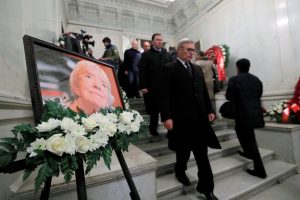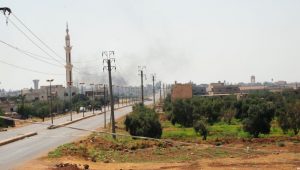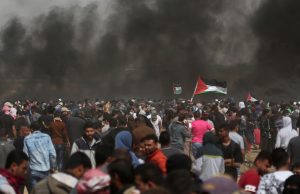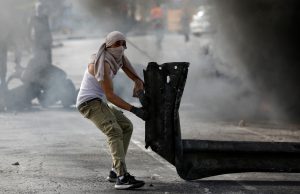
BEIRUT/GENEVA (Reuters) – More than 120,000 civilians have been uprooted by a Syrian army offensive in the southwest since it began last week, a war monitor said on Friday, and a senior U.N. official warned of catastrophe as they risked being trapped between warring sides.
Government forces and their allies appeared to be making significant gains in eastern Deraa province, where state media said they marched into several towns. A rebel official said opposition front lines had collapsed.
The Russian-backed offensive has killed at least 98 civilians, including 19 children, since June 19, the Syrian Observatory for Human Rights said.
It has also driven tens of thousands of people toward the border with Jordan and thousands more to the frontier with the Israeli-occupied Golan Heights, the UK-based monitor said.
Israel and Jordan – which is already hosting 650,000 Syrians – say they will not let refugees in.
“We left under bombardment, barrel bombs, (air strikes by) Russian and Syrian warplanes,” said Abu Khaled al-Hariri, 36, who fled from al-Harak town to the Golan frontier with his wife and five children.
“We are waiting for God to help us, for tents, blankets, mattresses, aid for our children to eat and drink.”
U.N. High Commissioner for Human Rights Zeid Ra’ad al-Hussein said there was a grave risk of many civilians being trapped between government forces, rebel groups and Islamic State militants who have a small foothold there, an outcome he said would be a “catastrophe”.
“The real concern is that we are going to see a repetition of what we saw in eastern Ghouta – the bloodshed, the suffering, the civilians being held, being under a siege,” U.N. human rights spokeswoman Liz Throssell said.
Syrian government forces backed by Russian air power have turned their focus to the rebel-held southwest since defeating the last remaining besieged insurgent pockets, including eastern Ghouta, near Damascus. The assault has so far targeted Deraa, not rebel-held parts of nearby Quneitra province at the Golan frontier which are more sensitive to Israel.
The campaign has shattered a “de-escalation” deal negotiated by the United States, Russia and Jordan that had mostly contained fighting in the southwest since last year.
President Bashar al-Assad pressed ahead with the offensive despite U.S. condemnations and warnings of “serious repercussions”. The United States has told rebels not to expect military support against the assault.
The chief Syrian opposition negotiator Nasr al-Hariri on Thursday decried “U.S. silence” over the offensive and said only a “malicious deal” could explain the lack of a U.S. response.
The Kremlin said Russian President Vladimir Putin and U.S. President Donald Trump will have a detailed discussion about Syria when they meet in July.
EASTERN DERAA PROVINCE
The war has been going Assad’s way since Russia intervened on his side in 2015, when he held just a fraction of the country. Today he commands the single largest part of Syria, though much of the north and east is outside his control.
Syrian troops have seized a swathe of rebel territory northeast of Deraa city. State TV broadcast scenes of what they said were locals celebrating the army’s arrival in the formerly rebel-held town of Ibta, where they said rebels were turning in their weapons.
State media said that government forces seized al-Harak and Rakham towns, and that insurgents in four other towns agreed to surrender their weapons and make “reconciliation” deals with the government.
“Most of the (people in) the eastern villages have fled to west Deraa and to Quneitra,” said Abu Shaima, a Free Syrian Army rebel spokesman.
Another rebel official said some towns were trying to negotiate deals with the state on their own. “There was a collapse in the eastern front yesterday,” he added. “The front in Deraa city is steadfast.”
Al-Manar TV, run by Assad’s Lebanese ally Hezbollah, said the army captured a hill overlooking a road linking eastern and western parts of Deraa province – an advance that would mean rebels could no longer safely use it.
The seven-year-long war has already displaced six million people inside Syria and driven 5.5 million abroad as refugees, and killed hundreds of thousands of people.
ISRAEL SENDS AID, WON’T OPEN FRONTIER
Many of the civilians on the move have fled from areas east and northeast of Deraa city and from the heavily populated rebel-held town of Nawa to its northwest.
Observatory Director Rami Abdulrahman, speaking by phone, said some people had also crossed into government-held areas, while others had gone to a corner of the southwest held by an Islamic State-affiliated group.
Jordan reiterated its position that newly displaced Syrians must be helped inside Syria. “Jordan has reached its capacity in receiving refugees,” Foreign Minister Ayman Safadi told the pan-Arab broadcaster al-Jazeera late on Thursday.
Israeli Energy Minister Yuval Steinitz, in an interview with Tel Aviv Radio 102FM, said: “I think we must prevent the entry of refugees from Syria to Israel, in the past we have prevented such cases.”
The Israeli military said an increased number of civilians had been spotted in refugee camps on the Syrian side of the Golan over the past few days, and that it had overnight sent aid supplies at four locations to people fleeing hostilities.
Footage released by the Israeli military on Friday showed a forklift truck unloading palettes with supplies that it said included 300 tents, 28 tonnes of food, medical equipment and medication, footwear and clothing.
(Reporting by Tom Perry in Beirut, Stephanie Nebehay in Geneva and Ori Lewis in Jerusalem; Editing by William Maclean and Raissa Kasolowsky)













